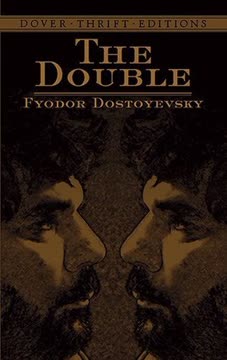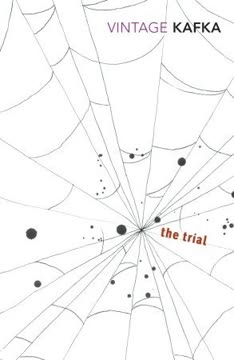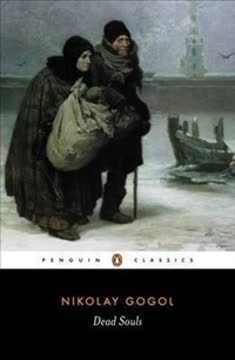Plot Summary
Golyadkin's Anxious Awakening
Yakov Petrovich Golyadkin, a low-ranking bureaucrat in St. Petersburg, wakes up in his drab apartment, unsure if he is awake or still dreaming. He is immediately beset by anxiety about his appearance, his servant Petrushka, and his standing in society. Golyadkin's morning is filled with nervous rituals—checking his wallet, fussing over his clothes, and rehearsing imagined confrontations with colleagues. He is both self-satisfied and deeply insecure, convinced that others are plotting against him. His interactions with his servant and the world outside are tinged with paranoia and a desperate need for validation. This opening sets the tone for Golyadkin's fragile sense of self and the blurred line between his internal fears and external reality.
Social Missteps and Paranoia
Golyadkin's day is a series of social blunders. He visits his doctor, Christian Ivanovich, seeking reassurance but instead receives vague advice to be more sociable and change his habits. Golyadkin's inability to communicate his anxieties only deepens his sense of alienation. He attempts to ingratiate himself with colleagues and acquaintances, but his efforts are clumsy and misunderstood. At a restaurant, he is mocked by junior clerks, and at a dinner party, he is turned away at the door, further fueling his belief that he is the target of a conspiracy. Golyadkin's paranoia grows as he interprets every slight and misunderstanding as evidence of a coordinated effort to undermine him.
The Ball and Humiliation
Desperate to assert his place in society, Golyadkin sneaks into a grand ball hosted by his former patron, Olsufi Ivanovich. He lurks in the shadows, rehearsing how he might enter gracefully, but when he finally steps into the light, he is overcome by anxiety and makes a spectacle of himself. His attempts to congratulate the host's daughter, Clara Olsufyevna, end in embarrassment and social disaster. He is publicly shamed, physically ejected, and left wandering the streets in a state of humiliation and despair. The ball crystallizes Golyadkin's deepest fears: that he is fundamentally unfit for the world he longs to join.
Night of the Double
Fleeing the scene of his disgrace, Golyadkin wanders the stormy streets of St. Petersburg, tormented by shame and a sense of persecution. In the darkness, he repeatedly encounters a mysterious figure who looks exactly like himself. At first, he doubts his senses, but the encounters become more frequent and undeniable. The stranger follows him home, and Golyadkin is horrified to find his double sitting in his own room, smiling with uncanny familiarity. The appearance of the double marks the beginning of Golyadkin's psychological unraveling, as the boundaries between self and other, reality and delusion, begin to collapse.
The Double Appears
The next day, Golyadkin tries to convince himself that the previous night was a hallucination, but the double—identical in appearance and name—appears at his workplace as a new employee. The double is everything Golyadkin is not: charming, confident, and socially adept. He quickly ingratiates himself with colleagues and superiors, even as Golyadkin is ignored and marginalized. The double's presence is both a literal and symbolic threat, embodying Golyadkin's repressed desires and fears. Golyadkin's attempts to expose the double as an impostor are met with indifference or ridicule, deepening his isolation.
A New Colleague
Golyadkin's double, now known as Golyadkin Junior, rapidly ascends in the office hierarchy, taking credit for Golyadkin's work and undermining his reputation. Golyadkin's efforts to befriend or confront his double are met with duplicity and mockery. The double manipulates situations to his advantage, turning colleagues against Golyadkin and spreading rumors about his mental state. Golyadkin's sense of reality becomes increasingly unstable as he is gaslighted by his own mirror image. The office, once a place of routine and order, becomes a theater of humiliation and betrayal.
Friendship or Rivalry?
In a moment of desperation, Golyadkin invites his double to his home, hoping to establish a truce or even a friendship. The double plays the role of a humble, grateful guest, sharing stories of hardship and appealing to Golyadkin's sympathy. For a brief moment, Golyadkin feels reassured, believing that the double is not a threat but a fellow sufferer. However, the double's behavior soon shifts, becoming manipulative and condescending. The encounter ends with Golyadkin feeling more confused and vulnerable than before, as the double's true intentions remain opaque.
The Double's Ascendancy
The double's campaign against Golyadkin intensifies. He spreads malicious gossip, forges letters, and orchestrates situations that cast Golyadkin in a bad light. Golyadkin's attempts to defend himself only make him appear more unstable. He is publicly humiliated at work and in social settings, while the double is celebrated and embraced. Golyadkin's identity is eroded as he is increasingly treated as a nonentity or a joke. The double's success is a cruel parody of everything Golyadkin has ever wanted, and his own impotence becomes unbearable.
Letters, Rumors, and Rejection
Golyadkin becomes obsessed with clearing his name and exposing the double. He writes frantic letters to colleagues and superiors, but his appeals are ignored or used against him. Rumors about his mental health and supposed misdeeds circulate, and even his servant Petrushka turns against him. Golyadkin's isolation is complete; he is rejected by friends, colleagues, and the very society he once aspired to join. The double, meanwhile, continues to thrive, taking over every aspect of Golyadkin's life. The sense of persecution becomes overwhelming, and Golyadkin's grip on reality slips further.
Golyadkin's Descent
Haunted by dreams and hallucinations, Golyadkin's mind unravels. He imagines endless replicas of himself swarming the city, each one more successful and beloved than he is. He is tormented by the belief that everyone is conspiring against him, and that his very existence is being erased. His attempts to seek help—from doctors, superiors, or acquaintances—are futile. The boundaries between self and other, real and unreal, dissolve completely. Golyadkin is trapped in a nightmare of his own making, unable to distinguish friend from foe, truth from delusion.
The Final Confrontation
Driven to the brink, Golyadkin confronts his double in a public setting, demanding an explanation and recognition of his own identity. The double responds with mockery and contempt, turning the crowd against Golyadkin. In a final, humiliating scene, Golyadkin is physically and psychologically overpowered by his double, who orchestrates his public disgrace. Golyadkin's last attempts to assert himself are met with laughter and scorn. The double's victory is total, and Golyadkin is left broken and alone, his sense of self shattered beyond repair.
Madness and Surrender
Utterly defeated, Golyadkin wanders the city in a state of delirium. He is pursued by visions of his double and haunted by the sense that he is being watched and judged by everyone. His thoughts are fragmented and incoherent, alternating between self-pity, rage, and resignation. He is summoned to a final reckoning, where he is confronted by his double, his superiors, and the society that has rejected him. In a surreal, nightmarish sequence, Golyadkin is led away by his doctor, Christian Ivanovich, as the crowd looks on with a mixture of pity and satisfaction. Golyadkin's surrender is complete; he is no longer himself, but a shadow, a ghost, a cautionary tale.
The Carriage to Oblivion
In the final scene, Golyadkin is placed in a carriage and driven away, presumably to an asylum. The city recedes, and with it, any hope of redemption or recognition. Golyadkin's last thoughts are a jumble of fear, confusion, and longing for acceptance. The double, now triumphant, fades from view, leaving Golyadkin alone with his madness. The story ends with Golyadkin's total erasure—his identity consumed by the very forces he sought to resist. The carriage rolls into the darkness, and Golyadkin disappears from the world, a victim of his own divided self.
Characters
Yakov Petrovich Golyadkin
Golyadkin is the protagonist, a mid-level civil servant whose life is defined by insecurity, social awkwardness, and a desperate need for acceptance. He is both self-pitying and self-important, oscillating between fantasies of grandeur and crushing paranoia. Golyadkin's psychological fragility is evident in his obsessive rituals, his inability to communicate effectively, and his tendency to interpret every event as a personal slight. The appearance of his double exposes the deep fissures in his sense of self, as he projects his fears and desires onto an externalized version of himself. Golyadkin's descent into madness is both a personal tragedy and a reflection of the alienating forces of bureaucracy and social conformity.
Golyadkin Junior (The Double)
The double is Golyadkin's exact physical replica but his psychological opposite: confident, sociable, and adept at navigating the very social structures that confound Golyadkin. He is both a literal character and a symbolic manifestation of Golyadkin's repressed ambitions and anxieties. The double's rise mirrors Golyadkin's fall, as he usurps Golyadkin's place at work and in society. His actions are calculated to undermine and torment Golyadkin, yet he also embodies the qualities Golyadkin secretly desires. The double's existence blurs the line between reality and delusion, forcing Golyadkin—and the reader—to question the nature of identity and selfhood.
Petrushka
Petrushka is Golyadkin's servant, whose passive-aggressive behavior and silent reproach reflect Golyadkin's own self-doubt. He is both a witness to and participant in Golyadkin's unraveling, alternately enabling and undermining his master. Petrushka's eventual defection symbolizes Golyadkin's total loss of control over his environment and relationships. His presence is a constant reminder of Golyadkin's social and personal failures.
Christian Ivanovich Rutenspitz
Christian Ivanovich is Golyadkin's physician, whose advice to "change his habits" is both well-meaning and hopelessly inadequate. He represents the rational, scientific authority of the era, but is ultimately powerless to help Golyadkin. In the end, he becomes the agent of Golyadkin's institutionalization, embodying society's response to deviance and madness. His clinical detachment contrasts sharply with Golyadkin's emotional turmoil.
Olsufi Ivanovich
Olsufi Ivanovich is Golyadkin's former benefactor and the host of the fateful ball. He represents the established social hierarchy and the values of respectability and decorum. His rejection of Golyadkin at the dinner party is a turning point, signaling Golyadkin's expulsion from the world he aspires to join. Olsufi Ivanovich's authority is both protective and exclusionary, reinforcing the boundaries that Golyadkin cannot cross.
Clara Olsufyevna
Clara is the daughter of Olsufi Ivanovich and the object of Golyadkin's unspoken affection. She is more a symbol than a fully realized character, representing Golyadkin's longing for acceptance, love, and social elevation. Her presence at the ball and in Golyadkin's fantasies serves as a catalyst for his actions and his ultimate humiliation.
Andrey Philippovich
Andrey Philippovich is Golyadkin's boss, whose ambiguous signals and shifting attitudes contribute to Golyadkin's paranoia. He is both a potential ally and a source of anxiety, embodying the impersonal, hierarchical nature of the bureaucratic system. His interactions with Golyadkin are marked by a mixture of condescension, irritation, and occasional sympathy.
Anton Antonovich Setochkin
Anton Antonovich is a fellow clerk who serves as a sounding board for Golyadkin's complaints and anxieties. He offers practical advice and tries to reassure Golyadkin, but is ultimately unable or unwilling to intervene on his behalf. His limited empathy highlights the isolation and competitiveness of bureaucratic life.
Vakhrameyev
Vakhrameyev is a minor official who becomes involved in the spread of rumors and accusations against Golyadkin. His shifting loyalties and willingness to believe the worst about Golyadkin reflect the corrosive effects of gossip and suspicion in a closed social system.
Karolina Ivanovna
Karolina Ivanovna is Golyadkin's former landlady, whose involvement in rumors and intrigues contributes to his downfall. She represents the petty, judgmental side of society, always ready to believe and spread scandal. Her actions, though seemingly minor, have significant consequences for Golyadkin's reputation and sense of security.
Plot Devices
The Double/Doppelgänger
The central device of the novel is the appearance of Golyadkin's double, a physical manifestation of his psychological split. The double functions as both a literal character and a symbol of Golyadkin's repressed desires, fears, and social anxieties. His presence destabilizes Golyadkin's sense of identity, blurring the line between self and other, reality and hallucination. The double's actions mirror and invert Golyadkin's own, creating a hall-of-mirrors effect that heightens the novel's sense of unreality and existential dread.
Unreliable Narration and Subjective Reality
The narrative closely follows Golyadkin's perspective, immersing the reader in his anxieties, obsessions, and distorted perceptions. Events are filtered through his increasingly unstable consciousness, making it difficult to distinguish between objective reality and subjective delusion. This technique amplifies the novel's themes of alienation, paranoia, and the fragility of identity.
Bureaucratic Satire and Social Critique
The novel satirizes the petty hierarchies, rituals, and anxieties of bureaucratic life in 19th-century Russia. Golyadkin's struggles are both personal and systemic, reflecting the ways in which individuals are shaped—and often crushed—by impersonal institutions and rigid social norms
Last updated:
FAQ
```markdown
Synopsis & Basic Details
What is The Double about?
- A Bureaucrat's Descent: The Double follows Yakov Petrovich Golyadkin, a timid and socially anxious civil servant in St. Petersburg, whose life spirals into paranoia and delusion after he encounters a man who is his exact physical replica. This doppelgänger, Golyadkin Junior, begins to systematically usurp his life, career, and social standing.
- Identity Under Siege: The novella explores Golyadkin's struggle to maintain his sanity and identity as his double, a charming and manipulative version of himself, gains favor with his superiors and acquaintances. Golyadkin's attempts to expose the impostor are met with disbelief, ridicule, and further isolation, blurring the lines between reality and his deteriorating mental state.
- Psychological Horror Unfolds: It's a chilling psychological study of a man's fragmentation, depicting his increasing paranoia, self-deception, and the terrifying experience of being replaced by an externalized version of his own repressed desires and fears, culminating in his complete mental collapse.
Why should I read The Double?
- Pioneering Psychological Realism: Readers should delve into The Double for its groundbreaking exploration of a fractured psyche, predating much of modern psychological literature. Dostoevsky masterfully immerses the reader in Golyadkin's subjective reality, making his paranoia and confusion palpable, offering a unique, unsettling experience.
- Early Dostoevsky's Genius: It showcases Dostoevsky's nascent genius for probing the depths of human alienation and the grotesque, themes that would define his later, more famous works. The novella is a crucial precursor to his mature psychological novels, offering insights into his evolving literary style and thematic concerns.
- A Unique Narrative Voice: The narrative's intrusive, often mocking, yet deeply empathetic voice, combined with its repetitive, almost obsessive prose, creates a claustrophobic atmosphere that perfectly mirrors Golyadkin's internal torment, making it a compelling and unforgettable read for those interested in experimental narrative.
What is the background of The Double?
- St. Petersburg's Bureaucratic Underbelly: Set in the damp, foggy, and often oppressive St. Petersburg of the 1840s, the novella vividly portrays the dehumanizing environment of the Russian civil service. This setting, with its rigid hierarchies and petty intrigues, serves as a crucible for Golyadkin's anxieties, highlighting the social pressures that contribute to his psychological breakdown.
- Dostoevsky's Early Career: Published in 1846, The Double was Dostoevsky's second novel, following the success of Poor Folk. It marked a significant departure in style and theme, delving deeper into psychological realism and the grotesque, though it initially received a mixed reception, with some critics finding its experimental nature challenging.
- Influence of German Romanticism: The concept of the doppelgänger, or "double," was a popular motif in German Romantic literature (e.g., E.T.A. Hoffmann). Dostoevsky adapts this motif, transforming it from a supernatural phenomenon into a profound psychological exploration of a character's internal fragmentation, reflecting the intellectual currents of his time.
What are the most memorable quotes in The Double?
- "It would be a fine thing... if something was wrong with me today, if a pimple had suddenly appeared out of the blue, for example, or something else disastrous had happened; however, for the moment, it's all right; for the moment everything is going well." (Chapter 1): This quote encapsulates Golyadkin's pervasive anxiety and desperate need for self-assurance, revealing his fragile ego and the constant internal battle against perceived imperfections and external threats. It foreshadows his later descent into paranoia.
- "I am a man apart, and as far as I can see, I don't depend on anybody. I want to go out, too, Christian Ivanovich." (Chapter 2): This declaration to his doctor highlights Golyadkin's profound social isolation and his contradictory desires. He claims independence but simultaneously yearns for connection and acceptance, a central tension in his character and a key theme in The Double analysis.
- "Either you or I, one or the other, but both of us together is impossible!" (Chapter 10): This desperate line from Golyadkin's letter to his double perfectly articulates the existential crisis at the heart of the novel. It signifies his realization that his identity cannot coexist with his doppelgänger's, leading to a final, desperate struggle for self-preservation.
What writing style, narrative choices, and literary techniques does Fyodor Dostoevsky use?
- Intrusive, Mocking Narrator: Dostoevsky employs an omniscient, highly opinionated, and often mocking narrator who frequently interjects with commentary, questions, and direct addresses to the reader ("Reader," "ladies and gentlemen"). This narrative voice, while seemingly detached, paradoxically deepens the psychological immersion by mirroring Golyadkin's own self-consciousness and internal monologue, making the reader complicit in his unraveling.
- Repetition and Accumulation: The prose is characterized by extensive repetition of phrases, words, and Golyadkin's internal thoughts ("it's all right," "I am a man apart," "sans façon"). This stylistic choice reflects Golyadkin's obsessive mental state, his circular reasoning, and the suffocating nature of his anxiety, creating a sense of claustrophobia and reinforcing the themes of his deteriorating mental health.
- Grotesque and Absurdist Elements: Dostoevsky blends realism with elements of the grotesque and absurd, particularly in the depiction of the double and the increasingly surreal social interactions. The exaggerated characters, the farcical humiliations, and the blurring of reality and hallucination contribute to a sense of nightmarish unreality, highlighting the psychological themes in The Double.
Hidden Details & Subtle Connections
What are some minor details that add significant meaning?
- Petrushka's Silent Judgment: Golyadkin's servant, Petrushka, often responds with grumbling, "wolfish looks," or feigned ignorance, which Golyadkin interprets as knowing judgment. This subtle detail highlights Golyadkin's deep-seated insecurity and paranoia, as he projects his self-doubt onto even his lowest-ranking subordinate, revealing his fear of being seen and judged, a key aspect of Golyadkin's psychological state.
- The "Borrowed" Livery and Coat: Petrushka's ill-fitting, "fifth or sixth hand" livery (Chapter 1) and the double's "borrowed" frock-coat (Chapter 7) subtly underscore the theme of borrowed or assumed identities and social pretense. These details suggest that appearances are deceptive and that many characters, not just Golyadkin, are playing roles or wearing "masks" in society, connecting to the novel's critique of social climbing.
- The Falling Galosh and Lost Shoe: In Chapter 5, Golyadkin loses a galosh, then later his other shoe, while fleeing the ball. This seemingly minor detail symbolizes his progressive unraveling and loss of footing in reality. As he loses physical parts of his attire, he simultaneously loses his grip on his identity and social standing, foreshadowing his complete dishevelment and eventual institutionalization.
What are some subtle foreshadowing and callbacks?
- Doctor's "Change of Character": Christian Ivanovich's early advice to Golyadkin to undergo a "radical transformation of your whole life and, in a certain sense, a change in your character" (Chapter 2) subtly foreshadows the literal "change" that occurs with the appearance of the double. This seemingly innocuous medical advice takes on a sinister, prophetic quality as Golyadkin's identity is indeed "changed" and usurped.
- Golyadkin's "Doormat" Metaphor: Golyadkin repeatedly asserts, "I am not a doormat; I am not, my good sir, a doormat!" (Chapter 8), even as he is being metaphorically trampled. This desperate self-affirmation, a callback to his earlier internal monologues, ironically foreshadows his ultimate fate as a discarded, dehumanized figure, highlighting his inability to escape the very humiliation he fears.
- The "Siamese Twins" Analogy: Anton Antonovich's casual mention of "Siamese twins" (Chapter 6) as a way to normalize Golyadkin's situation is a darkly ironic piece of foreshadowing. While meant to reassure, it inadvertently highlights the grotesque and unnatural nature of Golyadkin's predicament, suggesting a physical and psychological bond that is both inescapable and ultimately destructive.
What are some unexpected character connections?
- The Collective Blindness to the Double: Initially, colleagues like Anton Antonovich fail to notice the "miraculous" resemblance between the two Golyadkins, then later acknowledge it with detached curiosity. This collective blindness and subsequent casual acceptance of the double suggest a societal complicity in Golyadkin's marginalization, implying that the social world is either too self-absorbed or too willing to accept convenient fictions to truly see his distress.
- Petrushka's Unspoken Alliance with the Double: Petrushka's increasingly insolent behavior and his final, drunken revelation ("they never come in twos, and they're not an offence to God and honest people" - Chapter 9) imply a deeper, unspoken understanding or even an alliance with Golyadkin Junior. This connection suggests that the double's ascendancy is not just a psychological event but also a social one, as even Golyadkin's loyal servant shifts allegiance to the more dominant figure.
- Karolina Ivanovna's Central Role in Intrigue: The "disreputable German woman" Karolina Ivanovna, Golyadkin's former landlady, is revealed through Vakhrameyev's letter (Chapter 9) to be a central figure in the "conspiracy" against Golyadkin. Her apartment becomes the double's lodging, and she is implicated in spreading rumors. This elevates a seemingly minor character to a pivotal role, connecting petty gossip and personal grievances to the larger, more sinister plot against Golyadkin.
Who are the most significant supporting characters?
- Anton Antonovich Setochkin: As Golyadkin's immediate superior and a "voice of reason," Anton Antonovich is significant for his initial attempts to engage with Golyadkin's anxieties, albeit with limited understanding. His gradual shift from mild concern to polite dismissal, and his casual acceptance of the double, reflect the bureaucratic indifference that isolates Golyadkin and the ease with which society adapts to the "new" Golyadkin.
- Vakhrameyev: This colleague, initially a friend, becomes a key agent in Golyadkin's downfall through his accusatory letter. Vakhrameyev embodies the petty betrayals and the power of gossip within the bureaucratic environment, demonstrating how quickly social alliances can shift and how easily a reputation can be destroyed by rumor and insinuation.
- The Cabman (Chapter 13): The cabman in the final chapter, though unnamed, plays a crucial role as a detached observer and a symbol of Golyadkin's fading connection to reality. His patient, almost pitying responses to Golyadkin's increasingly incoherent ramblings highlight Golyadkin's isolation and the world's growing perception of him as mad, serving as a final, mundane witness to his descent.
Psychological, Emotional, & Relational Analysis
What are some unspoken motivations of the characters?
- Golyadkin's Craving for Belonging: Beneath Golyadkin's outward displays of self-importance and independence lies a profound, unspoken motivation: a desperate craving for social acceptance and belonging. His elaborate preparations for the ball, his attempts to ingratiate himself, and his later pleas for recognition all stem from this deep-seated need, which, when thwarted, fuels his paranoia and self-destruction.
- The Double's Drive for Usurpation: Golyadkin Junior's motivation is purely opportunistic and parasitic, driven by an unspoken desire to completely supplant Golyadkin Senior. He embodies Golyadkin's repressed ambition and social cunning, acting without the moral or emotional constraints that paralyze the original, thus representing the ruthless, competitive undercurrents of the bureaucratic world.
- Society's Need for Conformity: The collective behavior of the other characters—their quick acceptance of the double, their dismissal of Golyadkin's pleas, and their participation in his humiliation—reveals an unspoken societal motivation: a preference for conformity and social ease over truth or individual well-being. They implicitly sanction the double's actions because he fits the social mold better than the awkward, anxious Golyadkin.
What psychological complexities do the characters exhibit?
- Golyadkin's Projection and Externalization: Golyadkin exhibits severe psychological projection, externalizing his own anxieties, self-loathing, and repressed desires onto his double. The double becomes the embodiment of Golyadkin's ideal self (charming, successful) and his worst fears (treacherous, usurping), making his internal conflict a literal, terrifying reality. This is central to Golyadkin's psychological state explained.
- The Fluidity of Identity: The novel explores the fragility and fluidity of identity, particularly in a bureaucratic society where one's worth is tied to external validation. Golyadkin's sense of self is so dependent on others' perceptions that when his double appears and is accepted, his own identity dissolves, highlighting how social roles can consume the individual.
- Paranoia as a Defense Mechanism: Golyadkin's pervasive paranoia, while a symptom of his mental illness, also functions as a twisted defense mechanism. By believing everyone is conspiring against him, he avoids confronting his own social inadequacies and failures, shifting blame externally rather than facing his internal shortcomings.
What are the major emotional turning points?
- The Rejection at Olsufi Ivanovich's Door (Chapter 3): This public humiliation is a critical emotional turning point, shattering Golyadkin's fragile hopes for social acceptance and confirming his deepest fears of exclusion. It directly precedes the appearance of the double, suggesting that this profound emotional wound triggers his psychological break.
- The Double's Appearance in the Office (Chapter 6): The moment Golyadkin sees his double sitting at a desk in his own department is a shock that solidifies his paranoia and marks the beginning of his active struggle against his usurper. This externalization of his internal torment transforms his vague anxieties into a concrete, terrifying threat, intensifying his emotional distress.
- The Public Humiliation at the Office (Chapter 8): The scene where Golyadkin Junior publicly mocks and physically assaults Golyadkin Senior, wiping his hand as if Golyadkin's touch is dirty, is a devastating emotional climax. This ultimate betrayal and public shaming completely shatters Golyadkin's dignity and any remaining hope of reclaiming his place, driving him further into madness.
How do relationship dynamics evolve?
- From Patronage to Rejection: Golyadkin's relationship with Olsufi Ivanovich, his former patron, devolves from a hopeful, albeit distant, connection to outright rejection. This shift symbolizes Golyadkin's loss of social standing and the unforgiving nature of the hierarchical society, which casts him out once he fails to conform.
- The Master-Servant Inversion: The dynamic between Golyadkin and Petrushka undergoes a significant inversion. Initially, Golyadkin attempts to assert authority, but Petrushka's passive resistance and eventual open defiance ("they never come in twos") reveal a shift in power. Petrushka's loyalty transfers to the more "successful" double, mirroring Golyadkin's broader social displacement and the erosion of his authority.
- The Double's Exploitation of Trust: The relationship between Golyadkin and his double evolves from an initial, desperate attempt at "brotherly" reconciliation (Chapter 7) to outright, malicious rivalry. The double systematically exploits Golyadkin's vulnerability and trust, using his own appearance to undermine him, highlighting the theme of betrayal and the destructive nature of a fractured self.
Interpretation & Debate
Which parts of the story remain ambiguous or open-ended?
- The Reality of the Double: The most significant ambiguity is whether Golyadkin Junior is a literal, physical being or a hallucination, a product of Golyadkin Senior's deteriorating mind. Dostoevsky deliberately blurs this line, presenting the double's actions as objectively real while simultaneously hinting at Golyadkin's mental instability, leaving the reader to question the nature of reality itself in The Double analysis.
- The Nature of Golyadkin's Illness: The precise diagnosis of Golyadkin's psychological condition remains open to interpretation. Is it a severe anxiety disorder, paranoid schizophrenia, or a unique form of identity crisis? Christian Ivanovich's vague advice and the lack of a clear medical explanation contribute to this ambiguity, inviting readers to consider the psychological themes in The Double from various perspectives.
- The Extent of the "Conspiracy": While Golyadkin perceives a widespread conspiracy against him, the narrative leaves it ambiguous how much of this is real social maneuvering and how much is a projection of his paranoia. Characters like Vakhrameyev and Karolina Ivanovna seem to genuinely turn against him, but the degree of their coordinated "intrigue" is never fully clarified, adding to the story's unsettling uncertainty.
What are some debatable, controversial scenes or moments in The Double?
- The Restaurant Patty Incident (Chapter 9): The scene where Golyadkin is charged for eleven patties instead of one, and then sees his double eating the tenth, is highly debatable. Is the waiter genuinely mistaken, or is the double actively sabotaging Golyadkin? This moment is crucial for interpreting the double's reality: if he physically ate the patties, he is real; if not, it's a hallucination, making it a key point in The Double ending explained discussions.
- The Judas Kiss (Chapter 13): The "resounding treacherous kiss" between the two Golyadkins at the ball, just before the final intervention, is a moment of profound betrayal and symbolic significance. Its controversial nature lies in its ambiguity: is it a literal act of the double's perfidy, or Golyadkin's distorted perception of his own self-betrayal and the final, internal surrender to his shadow self?
- Christian Ivanovich's Final Role: Christian Ivanovich's transformation from a detached doctor to the stern, almost demonic figure who takes Golyadkin away ("You will haf official quarters, with
Review Summary
The Double received mixed reviews, with some praising its psychological depth and others finding it confusing. Many readers appreciated Dostoevsky's exploration of the human psyche and the blurred line between reality and delusion. The protagonist's descent into madness and the ambiguity surrounding the existence of his doppelganger fascinated readers. Some found the writing style challenging, while others praised the novella's satirical elements and its examination of bureaucracy and social pressures. Overall, readers acknowledged the work's complexity and its significance in Dostoevsky's early career.
Similar Books
Download PDF
Download EPUB
.epub digital book format is ideal for reading ebooks on phones, tablets, and e-readers.










